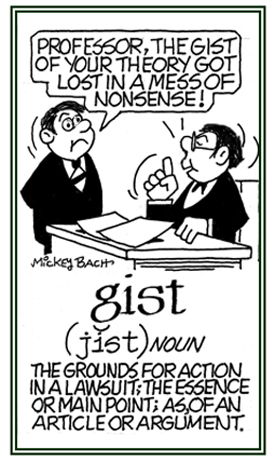You searched for:
“gist”
1. The main idea or substance of some longer or more complicated matter; the most essential or basic part: Ralph didn't read the whole article in the magazine; however, he got the gist of what was in it.

© ALL rights are reserved.
Go to this Word A Day Revisited Index
The gist of the lawyer's argument was that the law was unfair to women.
2. Etymology: "the real point" (of a law case, etc.), from Anglo-French legalese phrases; especially, cest action gist, "this action lies", meaning "this case is not sustainable by law", from Old French gist en, "it consists in, it lies in", from Latin jaceo, jacere, "to lie" and jacet, "it lies".
Go to this Word A Day Revisited Index
so you can see more of Mickey Bach's cartoons.
This entry is located in the following unit:
jacent-, jacen-
(page 1)
gist (verb), gists; gisted; gisting
To summarize, to extract from, and to present the most important parts of: "The teacher gisted the main points to the students as to what the final exam would include."
gist, grist, jest
gist (JIST) (noun)
The essence or main point of a matter: Shelby's opening speech at the inquest provided the gist of the issues to be reviewed.
grist (GRIST) (noun)
1. Grain, or a quantity of grain, for grinding: The farmer delivered corn to the mill to become grist or cornmeal.
2. Something that can be used to one's advantage: As a writer, Pete's friend, Trina, regards her difficult childhood experiences as grist for the mill; that is, she considers such experiences as examples which she can use in her novel.
2. Something that can be used to one's advantage: As a writer, Pete's friend, Trina, regards her difficult childhood experiences as grist for the mill; that is, she considers such experiences as examples which she can use in her novel.
jest (JEST) (noun)
A frivolous comment made to communicate mockery rather than precise truth: Bill's jest about the speaker was considered to be in poor taste.
The gist of the story involved the difficult experience that the farmer had when he tried to deliver the grist for milling.
This is not a story that should be told in jest because it is related to the farmer's precarious livelihood.
This entry is located in the following unit:
Confusing Words Clarified: Group G; Homonyms, Homophones, Homographs, Synonyms, Polysemes, etc. +
(page 2)
